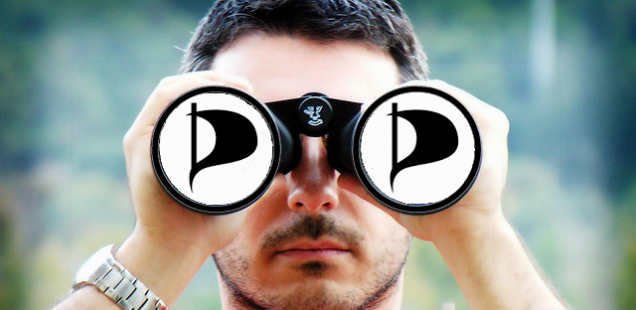News Digest. Week 4 | PirateTimes

News Digest. Week 4
This article is a summary of some of the main Pirate news that happened during the week that we did not write about.
Towards a True Democracy
Brazil lets its citizens make decisions about city budgets. Brazil is a leading innovator in participatory institutions. Brazilian municipal governments can voluntarily adopt a program known as Participatory Budgeting where citizens decide how to allocate public funds. Between 1990 and 2008, over 120 of Brazil’s largest 250 cities adopted Participatory Budgeting.
Support the release of Chelsea Manning. Amnesty International believes that Chelsea Manning, the US soldier sentenced to 35 years’ imprisonment for leaking classified government material she believed was in the public interest, should be shown clemency and immediately released. Please sign in support of AI’s letter to Major General Buchanan, which will be included in the clemency petition to be submitted by Chelsea Manning’s attorney in early 2014.
Citizens Abused: Towards an Orwellian 1984 World
From Stasi to NSA, lessons to take. An interview with Anke Domscheit-Berg chairwoman of the State of Brandenburg Pirate Party, held at DLD14 Conference in Munich. Some excerpts:
- 02:14 – “… they [The Stasi] were opening my letters, they didn’t bother to use hot steam or so, they just right opened, […] searched my student home”
- 02:36 – “… [The Stasi] tried to hire me as an informer to spy on my fellow students. And this is actually the point where I today believe there is a very close connection between Stasi and NSA […]. They tried to convince me, […] blackmailing me and to do that they used really innocent information about me and my personal life.”
- 04:17 – “Any information can be used against you, about your passions, about your fears, about the relationships you have”
- 05:32 – “Even if we believe, what I do not, that they are all good guys and don’t do anything bad with the data, how can we be sure that this is still the case in 20 years or 30 years?”
- 08:33 – “[…] democracy is nor there forever, […] so we have to fight to keep them [democratic rights], otherwise we might loose them again”
The Inside Story of Tor, the Best Internet Anonymity Tool the Government Ever Built. A story of how Tor was built, who operates it and how the NSA has been attacking it for years and why most (but not all) of these attacks have been frustrated… so far.
Washington State Bill Proposes Criminalizing Help to NSA. Practically speaking, the bill prohibits state and local agencies from providing any material support to the NSA within their jurisdiction. This includes barring government-owned utilities from providing water and electricity. It makes information gathered without a warrant by the NSA and shared with law enforcement inadmissible in state court. It blocks public universities from serving as NSA research facilities or recruiting grounds.
Maybe the Most Orwellian Text Message a Government’s Ever Sent: “Dear subscriber, you are registered as a participant in a mass disturbance.” That’s a text message that thousands of Ukrainian protesters spontaneously received on their cell phones today, as a new law prohibiting public demonstrations went into effect. It was the regime’s police force, sending protesters the perfectly dystopian text message to accompany the newly minted, perfectly dystopian legislation. In fact, it’s downright Orwellian.
UK’s New Internet Filter or Censor? Before Christmas British ISPs turned on a system that requires subscribers to actively choose whether they want filtering that will block material in broad categories such as sex, alcohol, violence, and hate speech. The biggest complaints are that there is no transparency about what is blocked; it’s extremely difficult to get an innocent site unblocked. Worse, the blunt-instrument approach to categories can mean disastrous errors – such as in December, when the mobile operator O2 was found to be blocking most police and NHS sites, the child abuse hotline Childline, and the Samaritans’ suicide prevention site.
Q&A session with Edward Snowden on 23 January. Edward Snowden answered questions from Twitter users about the balance between privacy and safety, threats to his life, how should the community react, the possibility of returning to the US, the importance of properly implemented strong encryption and more.
Police used water cannon and fired teargas to disperse hundreds of protesters that gathered in Istanbul’s central Taksim Square on Saturday for a rally calling against a bill that would tighten government control over the Internet.
Ukraine’s new charter for oppression. Repressive legislation passed at record speed without discussion in the Ukrainian parliament, must be immediately repealed, Amnesty International said today. The new laws passed on 16 January will suffocate freedom of speech and the right to peaceful protests. It paves the way for the prosecution of journalists and civil society activists and the closure of non-governmental organizations (NGOs), internet news sites and religious organizations.
Main findings of Oxfam International Report on economic inequality:
- Almost half of the world’s wealth is now owned by just one percent of the population.
- The wealth of the one percent richest people in the world amounts to $110 trillion.
- The bottom half of the world’s population owns the same as the richest 85 people in the world.
- The richest one percent increased their share of income in 24 out of 26 countries for which we have data between 1980 and 2012.
- In the US, the wealthiest one percent captured 95 percent of post-financial crisis growth since 2009, while the bottom 90 percent became poorer.
- Half of the world owns 99.3%, leaving 0.7% for the other half.
Tools for democracy
Liquid Democracy is one of the boldest contemporary innovations in democratic decision-making. The idea uses web technology that allows users to interact in new ways. Its primary innovators are located in Berlin, and Germany has been the first to adopt and apply Liquid Democracy systems in the context of political parties, parliamentary processes, and some organizations.
18 tools to aid citizen participation (in Spanish): Agoravoting, Adhocracy, Liquid Feedback, Helios Voting, Appgree, Incoma, Change.org, Loomio, Vilfredo, Senatia, Irekia, Citizen Cosponsor, Votenaweb, DcCode, Citizen Cosponsor Project, Friction Free Democracy Project, Votalo o Botalo, Open Congress.
Hide in plain sight: BitTorrent creator develops DissidentX a steganography software. Encryption tools help people keep secrets. Bram Cohen has a more subtle ambition: he wants to help people keep secret the act of keeping secrets.
Book: Does the Richness of the Few Benefit Us all? by Zygmunt Bauman
“20 or 30 years ago inequalities between developed and developing societies were growing, while inequality within a (rich) society decreased. And we thought, at least we Europeans, with our welfare state we had solved the problem of inequality. But during the las 20 or 30 years the gap between the developed countries and the rest of the world is decreasing, while inequalities within rich societies are skyrocketing.”
Open Policy Making Tools and Techniques. Tools and techniques to open up the policy making process.
The Public Eye sheds a critical light on irresponsible business practices and provides a platform to publicly criticize cases of human and labor rights violations, environmental destruction or corruption. The date and location of the Public Eye Awards are set deliberately to coincide with the annual meeting of the World Economic Forum.
Featured image: CC BY-SA gerlos

About Pedro Gutierrez
The certainty that a World War on Democracy was going on and we, the people, were unaware of it was keeping me up at night.
The fact, crystal clear now after Snowden’s revelations, that the new battlefield is your mobile, your laptop, your data and so, that every citizen (i.e. you) is being considered a target was inconceivable for me. And it became worse when I realized that most people just didn’t care about it: “I don’t mind a bit of spying? I’m a good citizen I’ve nothing to hide”.
So when Pirate Times let me write about it in this blog I was happy to finally take action.
But dear reader be warned because it may happen to you what already happened to me. Reporting week after week about the battles for democracy has changed my perception of the magnitude of this conflict. I already thought when I started that the situation was terrible and the conflict was not winding down but, no matter what, at the end of every week when I submit my post I realize again that I had underestimated it all.
All content is CC-BY if not mentioned otherwise. Please link back to us if using content.













Recent Comments